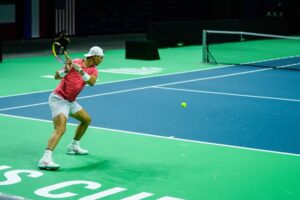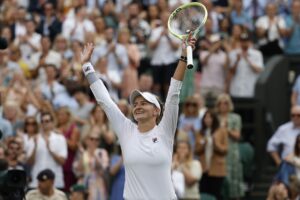When Kei Nishikori and Hyeon Chung take to the court on Saturday they will have created a new tennis milestone. Their clash will mark the first time in tennis history that two players from the Far East have met in the third round of a Grand Slam.
Few can argue that this – while it may not receive the recognition it deserves – is a landmark moment for tennis in the region. It is a section of the world which is starting to make its mark on the tennis landscape, driven forward by the talismanic figures of Li Na and Kei Nishikori.
Kei Nishikori and Li Na – catalysts of change
Both are icons in, not just their own country, but the region as a whole and are clear evidence that the Far East now believes it can crack the tennis bubble. The success of these two players seems to have opened the door for a wave of new talent muscling its way into the fold.
Kei Nishikori’s Saturday opponent Hyeon Chung is perhaps the leader of this new wave. Never far from a #NextGen promotional campaign, Chung has had a wonderful clay court to date.
The South Korean’s most impressive run this year came in Barcelona when the youngster reached the quarter-finals, defeating the German pair of Philipp Kohlschreiber and Alexander Zverev in the process. This run was only brought to a halt by Rafael Nadal and, on clay, that is perfectly acceptable this year.
He followed the Barcelona success with a semi-final in Munich, falling to Guido Pella in an enthralling three set encounter. Now at Roland Garros, Sam Querrey and Denis Istomin have fallen at the feet of Chung in the opening two rounds.
New crop of players from the Far East
Yet Chung is just one member of the Kei Nishikori supporting cast. 21-year-old Yoshito Nishioka found some marvellous form in Indian Wells earlier in the year and moved into the top 70 before a horrible ACL injury brought a halt to his season in Miami.Two more Japanese players, Taro Daniel and Yuchi Sugita, are also lower down in the top 100.
Chung is not the only talented youngster to hail from South Korea either. Duck-hee Lee, a partially deaf 19-year-old, has an exciting future and is on the cusp of bridging the gap into the top 100.
While Nishikori’s success seems to have inspired plenty of men from Japan and South Korea, Li Na’s success is inspiring a similar wave of players from China on the women’s side. Shuai Zhang and Shuai Peng have both been on the circuit for over ten years but are finding more and more familiar names supporting them in the latter stages of tournaments. Qiang Wang troubled Venus Williams in the first round of Roland Garros and is not far from the top 50. Zhang, Peng and Wang are joined by Yingying Duan and Saisai Zheng who complete the five Chinese later plugging away in the top 100.
Japan also has four players in the top 100 including the hugely talented Naomi Osaka. Alongside Osaka is the recognisable name of Kurumi Nara, Nao Hibino and Risa Ozaki. Most promising for Japan is that all four of these players are younger than 26.
Tennis’ growth in the Far East has certainly been a slow burner but the rewards are starting to show. The visibility of notable stars at the top of the game has opened up the floodgates and a host of future stars are now starting to follow suit.
French Open: Kei Nishikori or Hyeon Chung?
That bring us back to the small matter of the match in question; Kei Nishikori versus Hyeon Chung. On paper it is the superstar Nishikori who holds all the cards but tennis is not played on paper and Chung has a more than reasonable chance.
The big question mark is around Nishikori’s fitness. There were concerns before the tournament began and these came back to the fore when he brought on the trainer in his second round match against Jeremy Chardy.
There are a remarkable number of similarities between the two. Both have only dropped one set so far in the tournament. Nishikori has won seven of his last ten matches while Chung has won eight. Both are predominantly defensive baseliners and both perform well on clay.
What this match is likely to be is abrasive. A battle of attrition could certainly favour Chung, especially with the lingering doubts over whether Nishikori’s body will hold up. If Nishikori wins this it will be in straight sets. Anything longer could prove problematic.
Whatever the result of the match the real winner here is the development of tennis. Tennis can historically be linked to certain areas of the world and the more matches in Grand Slam’s between players from new parts of the world the better.
This might be the first third round Grand Slam meeting between two men from the Far East but, given the growth of the sport in the region, it is unlikely to be the last.
Enjoy what you read? Make sure to take a look at our complete 2017 French Open coverage for other great content similar to this.
Main Photo:





